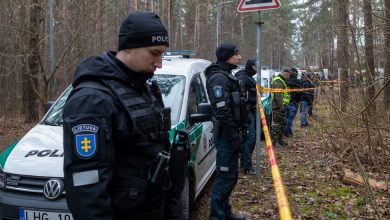From Flight Attendant to Funeral Planner: New Beginnings in the Covid Era

HONG KONG — Before she became a funeral planner, Connie Wong was a flight attendant for a Hong Kong airline. The sudden end of a career she had cherished for six years brought its own kind of grief, she said.
It was one of many such losses experienced by residents of the Chinese territory. Hong Kong’s economy began deteriorating in 2019, when a proposed extradition law set off months of fiery street clashes between protesters and police. Then, during the coronavirus pandemic, harsh and constantly evolving restrictions that hewed closely to the mainland’s “zero Covid” policy upended entire industries. Numerous businesses were forced to close, thousands of people left the city, and some of those who remained have had to reinvent themselves.
When Cathay Dragon, an arm of Hong Kong’s flagship carrier, Cathay Pacific, shut down in 2020 as travel came to a halt, Ms. Wong was among thousands left jobless. Accustomed to working red-eye flights, she couldn’t sleep at night.
“Some people lost their family members. Some emigrated. Others lost their health — and not just their body health, but their mental health also,” she said recently. “It’s not just Hong Kongers, but the whole world is experiencing this. It’s hard to face. I’ve lost my job. But life will always bring alternatives.”
A Guide for the Grieving
At Cathay Dragon, Ms. Wong, 35, had often asked to be assigned to flights to Kathmandu, Nepal, so she could volunteer there at a children’s home and animal shelter. The pursuit of something similarly fulfilling led her to apply last summer to be a life celebrant at Forget Thee Not, a Hong Kong nonprofit organization that tries to make dignified funerals affordable to families in need.
She meets several times a week with families, in an airy room decked with flowers. As she helps them plan ceremonies, she suggests writing notes with memories to leave on or inside the coffin, as a way to show gratitude or let go of grudges as they say farewell. For the funeral of a 4-year-old, Ms. Wong decorated the seats with cutouts of the girl’s favorite cartoon character.
In some respects, Ms. Wong’s previous job experience turned out to be transferable, she said. Much as she had once found ways to placate passengers facing flight delays, she was now finding workarounds for people in far greater need.
The adjustment was not easy. After her first few funerals, images of the grieving families replayed in her mind at night. She could barely eat from the stress, and her hair began to fall out. In November, she took sick leave, which lasted for months. Her bosses asked her to reflect on whether this was the right job for her.
Ms. Wong returned in April, as Hong Kong was facing its worst outbreak of the coronavirus. Hospitals were strained beyond capacity, and thousands of older people died of Covid-19. She plunged right back in. When relatives could not attend funerals in person after testing positive for Covid, she set up livestreams and narrated the rites.
There are some days when she longs to be flying again. But she says she has found a more far-reaching satisfaction in helping struggling families process a loss.
“The impact of Covid pushed us to face reality,” she said. “We have to adjust.”
The Covid Cleaner
Though the pandemic all but grounded the aviation industry, Mandi Cheung’s day job as a security guard at an aircraft engineering firm was unaffected. But he quit in March to become a cleaner at a quarantine facility for Covid patients.
It was a chance to make “quick money” as he saved up to emigrate to Britain, he said. The six-day-a-week cleaning job paid about $3,000 per month, roughly $1,000 more than his security job had.
At the peak of the Covid outbreak this year, Hong Kong’s hospitals and quarantine centers faced a large overflow of patients. Mr. Cheung’s quarantine camp near the Tsing Yi port, which has nearly 4,000 beds, was one of eight hastily constructed facilities. The experience was more harrowing than he expected.
Mr. Cheung, 35, was not allowed to drink water or use the bathroom while wearing personal protective equipment. He cleaned up toilets and used rapid test kits every day, worrying about taking the virus home. His mother would let him in only after he sanitized his entire body at the door. (As the number of infections plateaued and pandemic fatigue set in, she stopped caring, he said.)
“Resources were really lacking — the distribution of labor was unequal,” he said. “I was filled with resentment as I worked. I kept telling myself that it would just be for a few months.”
In the meantime, he had kept taking additional jobs. In May, he put in six-hour shifts at a coffee shop in his neighborhood after working overnight at the quarantine facility.
Mr. Cheung had intended to work at the quarantine center for five months, but it closed in June as the number of “V.I.P.s,” as his team leader told him to refer to patients, dwindled. He plans to work full time at the coffee shop until he leaves Hong Kong.
Before the pandemic, Mr. Cheung ran a nocturnal coffee operation called NightOwl, but it was difficult to sustain financially under Covid dining restrictions. He hopes to open a similar business one day, after emigrating. But he is also curious about new experiences.
“In the end, I will be exploring a new world,” he said.
A Carer for All Ages
As an in-flight service manager for Cathay Dragon, Connie Cheung, 57, had reached the highest rung of her career ladder. Ms. Cheung, who is not related to Mandi Cheung, joined the airline, then called Dragonair, more than three decades ago as a flight attendant. She had recently extended her contract after reaching 55, the retirement age for cabin crew.
She was caring for her grandson and her daughter-in-law when the airline shut down in 2020. She decided to take a series of government courses in postnatal care, learning how to perform breast massages and boil hearty herbal soups. She started training to be a pui yuet, or nanny, for infants and a carer for new mothers, and in 2021, she began her second career.
“Now I’m a beginner again,” Ms. Cheung said.
She and a friend, Wing Lam, 48, another in-flight service manager turned postpartum nanny, trade tips on how to manage germophobic mothers and grumbling grandparents. They joke about how their sleek suitcases have been replaced by metal carts, which they haul from the subway to wet markets to buy groceries for the meals they cook for their clients.
When she lost her airline job, Ms. Cheung had been making roughly $4,500 a month plus benefits, like health care. Now, she makes about $3,300 a month. Ms. Lam, for her part, misses the thrill of managing a plane crew, despite the stress and uncertainties that came with every flight.
In May, Cathay Pacific sent recruitment emails to thousands of laid-off employees, asking them to reapply — for entry-level positions.
Ms. Lam holds out hope that the airline will rehire senior staff. But in the meantime, she plans to use her in-flight managerial experience as a nanny agent, matching carers with parents. She has begun training people who are new to the industry, including former flight attendants.
Ms. Cheung is staying the course. Her calendar has filled up as clients have referred her to other expectant mothers. While the work is unstable — she’ll get no requests one month, then several the next — she hopes it will soon pay for family vacations.
She said she could see herself taking care of babies for the next 10 years: “I have found my new direction in life.”



